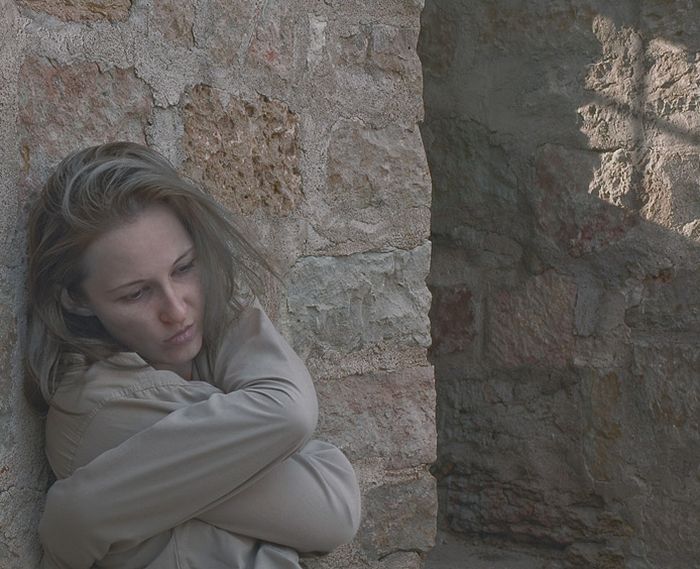Part 1, Part 2, Part 3, Part 4, Part 5
Part 6A, Part 6B, Part 7A, Part 7B
Part 8A, Part 8B, Part 9A, Part 9B
The Demon of Noonday
Despondency, unlike sorrow, is more connected with laziness, with spiritual and physical enfeeblement. It’s not for nothing that the Holy Fathers call despondency the “demon of noonday,” which battles the ascetic in the middle of the day, inclining the monk to sleep after lunch and distracting him from prayer. Remember that for a monk (especially in antiquity), noon is really halfway, the middle of the day, because the monastics rise early, and according to monastic custom, a meal is served twice a day, at lunch and dinner.
St. Theophan the Recluse writes that despondency is boredom with every task, whether mundane or prayerful, a desire to abandon your work: “You lose your enthusiasm both for standing in church and for praying to God at home, and for reading, and for doing the usual good deeds.” My soul hath slumbered from despondency (Ps. 119:28), St. Theophan writes, citing the words of the Psalmist David.
Despondency, boredom, heaviness of spirit and body will come sometimes, perhaps for a long time, St. Theophan warns. And you shouldn’t think that the soul will always have peace and joy from prayer; there are periods of decline, laziness, cooling off, and lack of faith. Cooling off in the spiritual life, its crisis, is one of the signs of despondency. But here we must apply our will and force ourselves. In any affair, we only achieve results when we constantly force ourselves to do it, pick ourselves up by the hair, like the famous Baron Munchausen, and pull ourselves out of the swamp of laziness, laxity, melancholy, and despondency.
No one will achieve anything in any matter if he doesn’t force himself to do it regularly. This is the education of the will. You don’t want to go to church, you don’t want to stand in prayer in the morning and evening—force yourself to do it. When you’re suffering from laziness, when it’s hard to get up every morning and go to work or do daily tasks, remember there’s this wonderful word: “necessary.” Not “I want to—I don’t want to,” but simply “it’s necessary.” And so, with these little things, we cultivate willpower.
Good deeds also don’t just happen—you have to force yourself to do them too. Indeed, nowhere does the Gospel promise that it will be easy, but on the contrary: The Kingdom of Heaven suffereth violence, and the violent take it by force (Mt. 11:12). We say: divine service, Church service. But after all, service, by definition, isn’t some easy, pleasant task; it’s work, labor, sometimes difficult. And the reward for it is moments of spiritual uplift and joyful prayer. But it would be great boldness to expect that these gifts always accompany us. Often, it’s very difficult for us to stand in prayer and in church. Sometimes it’s crowded, or stuffy, or perhaps someone’s distracting us, it’s noisy, people are passing candles… But this doesn’t mean we have to wait for some special conditions for prayer, since they may never come. We shouldn’t look for comfort and spiritual experiences in church, but rather an encounter with God.
I once noticed that one man always went to church and communed on weekdays. I asked him why he didn’t approach the Holy Mysteries on Sundays or feast days. He said he didn’t like to be at church on feast days and Sundays—too many people, the crowd, the fuss, it’s better on a work day when no one bothers you, and so on. I told him that’s completely incorrect: You need to go to church on weekdays, of course, but it’s most important to go to the feast day and Sunday services—this is the fourth commandment of God. You also need to receive Communion with all the parishioners; the whole church community communes from one chalice, and therein lies our unity. Of course, it may be easier for someone to pray when there’s no one in church, but we have to learn to pray even in a large gathering of people, since we’re not going to enter the Kingdom of Heaven alone. The services, the litanies are designed in such a way that we pray as a whole gathering, a whole congregation of parishioners, “with one mouth and with one heart.” In Soviet times, there were so few churches that sometimes you couldn’t even raise your hand to cross yourself in church, but people still went to church and received joy from prayer.
So we have to force ourselves to do everything, beginning, perhaps, with small steps; then despondency won’t be able to pull us into its quagmire, and thus we’ll gradually reclaim island after island. Of course, this requires not a burst of energy, but constancy.
In his Patericon, St. Ignatius (Brianchaninov) describes a case where a certain monk fell into despondency, abandoned the fulfillment of his prayer rule, and couldn’t find within himself the strength to begin his monastic labors again. The elder whom he turned to for advice told him this parable: There was a man who had a field overgrown with thorns. One day he told his son to clear the field so it could be sown with something. The son went to the field, but seeing how bad it was, he became troubled, grew despondent, and lay down on the ground and fell asleep. When his father saw him sleeping, he woke him up and said, “My son, if you would just work as much land as you’re sleeping on now every day, the work would progress little by little, and you wouldn’t be disobedient to me.” Heeding his father’s words, the young man began to do just that and cleared the field of weeds in a short time. “And so you, my son,” the elder said to the brother, “don’t despond, but gradually take up your asceticism, and God by His grace will restore you to your former state.” And so it happened: The monk found spiritual peace and prospered in the Lord.
There’s an expression: “The more you sleep, the more you want to.” The more you remain in comfort and relaxation, the more you get used to this state. Don’t forget that despondency is one of the eight passions, which means it captures and enslaves people and makes them dependent. Don’t think that the habit of being lazy, relaxing, and being bored will someday become tiresome and pass by itself. We have to wage war against it, disciplining our will and soul, moving ourselves toward every good deed.
Cooldown
One of the properties of despondency is a cooldown.
Cooling begins, as St. Theophan says, with forgetfulness: “God’s benefactions are forgotten; and God Himself, our salvation in Him, the danger of being without God, and the remembrance of death depart—in a word, the entire spiritual realm is closed off.” “Be on guard and hasten to restore the fear of God and warm your soul,” the Holy Hierarch advises. “It [cooling off.—F.P.] happens involuntarily... but it also happens from deliberate deeds... from external distractions, disorderly conversations, satiety, excessive sleep... and much else.”
Since a cooldown born of despondency and laziness is often coupled with forgetting God’s benefactions and losing interest in the spiritual life, we have to learn to see the presence of God in all everyday events and thank Him for the gifts He sends us. Often, a man who has fallen into despondency and has cooled off spiritually rarely confesses and communes; it’s difficult for him to prepare and approach the Holy Mysteries. And without participating in the Sacraments, without the grace of God, he’ll move further and further away from God, and he’ll only grow colder. If despondency is battling us, the first thing to do is to prepare and make a detailed confession and receive Communion. And try to do it more often, preserving this spiritual gift within yourself.
I very well remember what an upsurge there was after the celebration of the 1,000th anniversary of the Baptism of Rus’. Priests I know baptized children and adults literally by the thousands. Community life began to revive. In the early 1990s, many Church organizations, Orthodox brotherhoods appeared. We learned in practice what Church life is, common work; what it means to be brothers and sisters. Churches and monasteries began to be revived very rapidly, and most importantly—they were instantly filled with people—the people of God—ready to serve Christ. But unfortunately after this upsurge period came a period of cooling off, a decline. And very many people who came to the Church back then were unable to remain in it. And, as they say, “Some are no more, while others are far away.” The spiritual life can’t be sustained only by an impulse, by fervent burning. The salvation of the soul is a very painstaking work requiring consistency. An upsurge can be followed by a decline. That’s where the demon of despondency stands on alert.
If you’ve been visited by despondency and spiritual enfeeblement, you must, first of all, force yourself to lead a spiritual life, to not abandon prayer, and to participate in the Sacraments of the Church. Further, read spiritual literature, Holy Scripture. We must spiritualize our existence, overcome worldliness, and see the hand of God in our lives. And third: Force yourself to labor, and above all, for the good of others. The ancient ascetics noticed that the demons of despondency can’t even approach someone who never sits idle.
To be continued…





